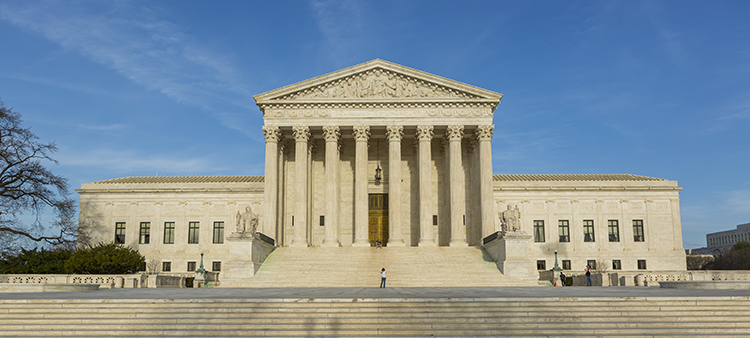Legal sports betting creates more work for lawyers and invites scrutiny of gambling industry

Shutterstock
Within the pantheon of fast-paced changes in the sporting world, the surprise twists of a walk-off home run, a Hail Mary touchdown or a game-winning buzzer-beater shot are nothing compared to the rush of states racing to legalize bets on such outcomes.
“It’s grown more than I would have ever predicted, faster than I would have thought,” says Jennifer Roberts. She is vice president and general counsel at online sportsbook WynnBET and an adjunct professor of gaming law at the University of Nevada, Las Vegas William S. Boyd School of Law and the University of Utah S.J. Quinney College of Law.
“I always say this is the fastest growth of gambling historically. If you look at the lottery, nearly every state has the lottery, but the first modern lottery started in 1964, so it took several decades to get there, whereas with sports betting, we’re in nearly 40 states within five years.”
The wave came in the wake of the U.S. Supreme Court’s 2018 decision Murphy v. National Collegiate Athletic Association, which struck down the Professional and Amateur Sports Protection Act. The act, which Congress passed in 1992, prohibited states from authorizing sports gambling beyond any laws that were already on the books. That grandfather clause effectively gave Nevada a monopoly on legal sports gambling because it was the only state that offered a full slate of legal sports wagers at the time. Three other states had extremely limited forms of sports betting that were also allowed to continue.
But New Jersey, which had had an on-again/off-again yearning for sports betting since missing a 1993 deadline to fall within the act’s exemptions, repeatedly challenged the law. The state was finally successful in Murphy, in which the high court found the act violated the 10th Amendment prohibition on the federal government “commandeering” areas of law left to the states.
Billions in bets
Taking the “over” on the number of states to legalize sports gambling since the Murphy decision would have been a great bet. The American Gaming Association, a trade group, counts 38 states plus the District of Columbia that have legalized sports betting (though at press time, two of those states don’t have active wagering yet).
“That’s rocket ship-type growth,” said Casey Clark, senior vice president of the American Gaming Association.
The association publishes an annual State of the States research report on all types of legal gambling. According to the 2023 report, gamblers legally bet a record $93.7 billion on sports in 2022, up from the previous record of $57.5 billion in 2021.
The 2022 figure translated to $7.56 billion of revenue for operators, $1.5 billion in tax revenue for states and $250 million in taxes for the federal government, according to the association.
Still, if revenue and resulting taxes seem low compared with the amount bet—it is.
“Sports betting is kind of a low-percentage game versus other more traditional games, so there’s a lot paid out to bettors, and what’s captured by operators isn’t as large as the number that’s thrown around,” Roberts says. “People kind of think that the benefits and the tax money from sports betting is going to be larger than it is.”
It does mean more work, though. While most states had processes in place for licensing gambling operations, lawyers still had to review the new applicants, draft new regulations—and answer to the public. In Massachusetts, which went live with sports betting on Jan. 31, 2023, the Massachusetts Gaming Commission held at least 140 public meetings in the six months leading up to the launch, according to Thomas Mills, the commission’s communication division chief.
Now that sports gambling has been brought into the light, perhaps the biggest change for the legal world is to identify and eliminate the kind of chicanery that might have no remedy on the illegal market.
For example, on April 28, according to published media reports, an Ohio sportsbook received unusually large bets on a baseball game between the University of Alabama and Louisiana State University, in which Alabama’s star pitcher was removed from the lineup before the game due to injury. The Ohio Casino Control Commission investigated and determined that the person placing the bets was communicating with Alabama coach Brad Bohannon, strongly suggesting that the bets were placed using inside information. Three days after the bets were placed, the commission ordered sportsbooks in Ohio to stop accepting bets on games involving Alabama, and within a week of the red flag going up, Alabama fired Bohannon.
Due to the sheer volume of bets that need to be monitored, however, states and professional sports leagues’ legal departments rely on third-party vendors to watch the action and notify officials so they can take action. In the Ohio case, the private watchdog company U.S. Integrity, working for both the state of Ohio and the Southeastern Conference, brought the suspicious activity to the attention of the casino control commission. U.S. Integrity contracts with many states and professional and collegiate leagues to provide this kind of service.
“Because it’s more prevalent in the legal market [and] there’s more regulation, there’s more access to information,” said Scott Petersmeyer, general counsel of the Pac-12 Conference. “I think it’s very helpful to have someone that’s monitoring suspicious activity … whether there’s suspicious line movements in our games, whether there’s deviations from officiating trends, whether there’s reason to believe that inside information is disclosed.” Redirecting demand
U.S. Integrity President Matthew Holt notes that several states wrote a monitoring requirement into their sports betting laws, and he says U.S. Integrity was founded to meet that need. Holt speaks of sports and sports gambling as two formerly separate “worlds” that since have fused, as ads for sportsbooks regularly run on ESPN and specific wagers are a frequent topic of conversation on pregame shows.
“Many of the professional and collegiate sports leagues also understood that as these two worlds collided, they certainly needed to understand what was happening; be aware of potential instances involving their athletes, coaches or personnel; and have a better understanding of the sports betting landscape as a whole as they start to enter into these corporate partnerships, big sponsorships, agreements with sportsbooks,” he says. “And thus we started signing clients from all sectors.”
The ability to exercise that level of control over betting activity is a big reason the industry has been lobbying for legal sports betting for years.
The American Gaming Association released a report in November 2022 finding that gamblers placed $63.8 billion in illegal sports bets in a 12-month period from September 2021 to August 2022, translating to revenue of $3.8 billion for illegal operators and costing states $700 million in tax revenue. The report arrived at these numbers by surveying gamblers about their legal and illegal activity, extrapolating the illegal amount. The survey showed the illegal market is still robust, though much smaller than before Murphy, when the association estimated it was a roughly $150 billion-per-year enterprise.
“Americans have been betting on sports for a really long time. There’s a misconception that Americans just started betting on sports in 2018,” Clark says. “We’ve seen pretty significant migration from betting action away from illegal, offshore, booking-type betting to the legal marketplace.”
One potential channel for illegal operators to offer is bets on in-state colleges, as many states that opened up gambling in the last five years prohibit bets involving in-state colleges. Roberts, while noting that every state has the right to carve out its own legislation, says she is “surprised” that more states didn’t follow the lead of Nevada, which legalized betting on in-state colleges in 2001 after decades of banning bets on University of Nevada, Las Vegas and University of Nevada, Reno games.
“They went down this college prohibition path before and realized that actually the transparency of wagering on regulated licensed sportsbooks was better than pushing it to the unregulated market,” she said.
Edward R. Winkofsky, a Greenberg Traurig shareholder and chair of the firm’s gaming practice, suggested that the prohibition on in-state college bets is a stepping stone to public acceptance that will gradually phase out over time.
This story was originally published in the December 2023-January 2024 issue of the ABA Journal under the headline: “Big Bet: Legal sports betting creates more work for lawyers and invites more scrutiny of the gambling industry.”
Kevin A. Schweitzer is a Chicago-based attorney who studied gaming law at the University of Nevada, Las Vegas William S. Boyd School of Law.



